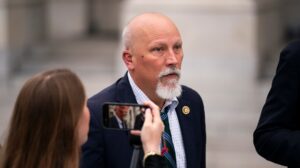Congress
Meet the new members: From governor to rank-and-file senator
The new member: Sen.-elect Jim Justice (R-W.Va.)
How they got here: Justice, West Virginia’s sitting governor, easily defeated Democrat Glenn Elliott by more than 40 percentage points to flip control of this Senate seat for Republicans.
Inside the campaign: Since announcing his Senate bid in April 2023, Justice was the heavy favorite for this key GOP flip opportunity. He easily dispatched Rep. Alex Mooney (R-W.Va.) in the GOP primary by more than 35 percentage points.
Justice is termed out as governor, making the Senate a tempting opportunity. His push got even easier when longtime Sen. Joe Manchin (I) announced he would not run for reelection. “I will tell you just this, with all in me, you shook up the world, we shook up the world … and now the challenges are unbelievable with what’s going on in D.C.,” Justice said at his victory speech.
The issues he’ll focus on: Justice has told reporters in West Virginia he hopes to nab spots on the Finance and Energy committees. He’s been especially critical of the Biden administration for its policies on energy and the southern border, topics he’s sure to focus on once a member of the Senate.
One non-policy matter of interest will be Justice’s attendance. People from both political parties detailed the governor’s iffy attendance record in the state to POLITICO earlier this year. Others fear health issues could complicate his participation in routine Senate business.
Background: Justice is one of the wealthier people in West Virginia, having inherited a coal mining company and owning the financially troubled Greenbrier luxury resort.
He won election to the governor’s office in 2016 as a Democrat but quickly reversed course and became a Republican less than seven months later. He easily won reelection in 2020 and has enjoyed high approval ratings throughout his tenure as governor.
Campaign ad that caught our eye: Justice encouraged folks to vote early in the Senate race alongside his omnipresent pet dog, Babydog. “Bring it home for Babydog and I,” he said.
Fun fact: Justice has been head coach of the girls basketball squad at Greenbrier East High School in Fairlea, West Virginia, since 2003, a position he’s steadily maintained even while governor.
We’re spotlighting new members during the transition. Want more? Meet Reps.-elect Wesley Bell (D-Mo.) and George Latimer (D-N.Y.).
Congress
Former FBI and CIA head prods Senate to reject Patel, Gabbard
A former head of the FBI and CIA is raising objections over whether Kash Patel and Tulsi Gabbard, President-elect Donald Trump’s picks to be directors of the FBI and national intelligence, respectively, are qualified to serve in the Cabinet.
In a letter to senators on Thursday, William Webster, the only person to lead both the FBI and CIA, wrote that neither nominee meets the demands of top intelligence jobs.
Webster, who is 100 years old, praised Patel’s patriotism but wrote that his allegiance to Trump was concerning.
“His record of executing the president’s directives suggest a loyalty to individuals rather than the rule of law — a dangerous precedent for an agency tasked with impartial enforcement of justice,” he said.
When it came to Gabbard, Webster wrote that her “profound lack” of intelligence experience stood in contrast to the seasoned leadership needed for the role.
“Effective management of our intelligence community requires unparalleled expertise to navigate the complexities of global threats and to maintain the trust of allied nations,” he wrote. “Without that trust, our ability to safeguard sensitive secrets and collaborate internationally is severely diminished.”
Trump’s transition did not immediately respond to a request for comment.
Webster was appointed FBI director in 1978 by President Jimmy Carter and remained director under President Ronald Reagan until 1987. Reagan tapped him to be head of the CIA until 1991, under President George H.W. Bush.
“I urge you to weigh the critical importance of nonpartisan leadership and experience,” Webster wrote. “The safety of the American people — and your own families — depends on it.”
Congress
Freedom Caucus chair: House GOP needs to consider if ‘current leadership is what we need’
House Freedom Caucus Chair Andy Harris told Fox Business on Thursday that the chamber’s Republicans need to consider if current leadership “is what we need” going into unified GOP government next year.
“Before the last couple of weeks, I was in his corner, but now we should consider what’s the best path forward,” Harris (R-Md.) said of Speaker Mike Johnson. “We do need to consider whether — if we’re going to advance Mr. Trump’s agenda — whether the current leadership is what we need.”
Harris’ comments come after he signaled last week that he was on the fence about whether or not to support Johnson during the Jan. 3 speaker vote, saying in a statement that he was “now undecided on what House leadership should look like in the 119th Congress.”
Johnson is on thin ice with his right flank after his handling of short-term government funding. Though the speaker kept opposition on the final proposal, which will fund the government until mid-March, at only 34 GOP no votes, he sparked conference-wide frustration over his handling of the funding debate.
The growing ire toward Johnson is coming at a bad moment for the Louisiana Republican’s political future. Because Republicans are expected to have a 219-215 majority on Jan. 3, due to Matt Gaetz’s early resignation, Johnson can only afford to have one Republican vote against him.
Rep. Thomas Massie (R-Ky.) became the first Republican to vow to vote for someone else. But several Republicans, including Harris, have said they are undecided or have refused to say if they will support Johnson in the wake of the continuing resolution.
Some of Johnson’s allies have publicly urged Trump to back him before the vote to help shore up his support and reduce the chances of a protracted speaker gavel fight. They’ve also warned that if they can’t quickly settle the speaker race, they risk not being able to certify Trump’s electoral college win on Jan. 6.
Johnson has worked hard to keep Trump on his side. And while the president-elect hasn’t publicly crossed Johnson since the funding debate, one Trump adviser told Blue Light News earlier this month that there wouldn’t be pushback if someone challenged Johnson.
Harris on Thursday said that Trump is going to need “strong leadership” given House Republicans’ thin margins and floated that the incoming president is “evaluating whether that exists.”
Though Harris said on Thursday that he was supporting Johnson until his handling of the spending debate, he floated Judiciary Chair Jim Jordan (R-Ohio) as a potential speaker candidate during a campaign stop with outgoing Rep. Bob Good (R-Va.) and other Freedom Caucus members in March. Jordan has repeatedly said that he is not running for the speaker’s gavel, or any other leadership position.
“I like Jim Jordan. I think he should have a shot at being speaker. I think he will have a shot at being speaker after the election,” Harris said in March, while explaining why he didn’t support a potential ouster vote against Johnson at that time.
Jordan was one of the GOP’s speaker nominees last year in the wake of Speaker Kevin McCarthy’s ouster but he was unable to get 218 votes on the floor.
Congress
How Schumer is prepping for Trump 2.0
In less than a month, elected Democrats will find themselves with a lot less power in Washington, with a GOP-controlled House, Senate and White House resulting in a landscape in which their ability to tussle with President-elect Donald Trump will be largely rhetorical.
But if Dem leaders have learned one thing from Republicans over the years, it’s that sometimes, the judiciary can be the best bulwark against the opposing party getting what it wants. As our Anthony Adragna reported Friday, Senate Democrats have approved 235 of Biden’s judicial picks, eclipsing Trump’s 234 first term judicial nominations.
“I don’t know exactly what [Trump will] do. But I can tell you this: The judiciary will be one of our strongest — if not our strongest — barrier against what he does,” Senate Majority Leader Chuck Schumer told Playbook in an exclusive interview this week.
Four years ago, Schumer launched a plan (along with President Joe Biden) to use the party’s Senate majority to prioritize not just passing legislation, but also pushing through as many judicial nominations as possible.
The result?
“When we started out, we knew it would be a very difficult job to do more than Trump had done,” said Schumer. “But we did: We got 235 — more than a quarter of the federal judiciary was appointed by our Senate and by the president.”
Read the rest of POLITICO’s interview with Schumer in Thursday’s Playbook. And ICYMI, more judicial nominee coverage from the past week:
-

 The Josh Fourrier Show2 months ago
The Josh Fourrier Show2 months agoDOOMSDAY: Trump won, now what?
-
Economy2 months ago
Fed moves to protect weakening job market with bold rate cut
-
Economy2 months ago
Harris dismisses Trump as ‘not serious’ on the economy in BLN interview
-
Congress2 months ago
Trump’s border czar promises ‘hell of a lot more’ deportations than first term
-
Health Care2 months agoAnti-abortion forces broke the left’s post-Roe winning streak, but 7 more states enacted protections
-
Economy2 months ago
It’s still the economy: What TV ads tell us about each campaign’s closing message
-
Economy2 months ago
Biden touts economic gains, acknowledges a long way to go
-
Health Care2 months ago
More abortion ballot measures are set to pass. Then state courts will have their say.







